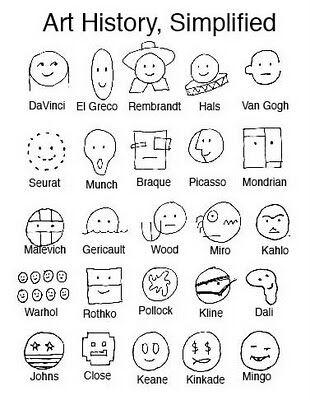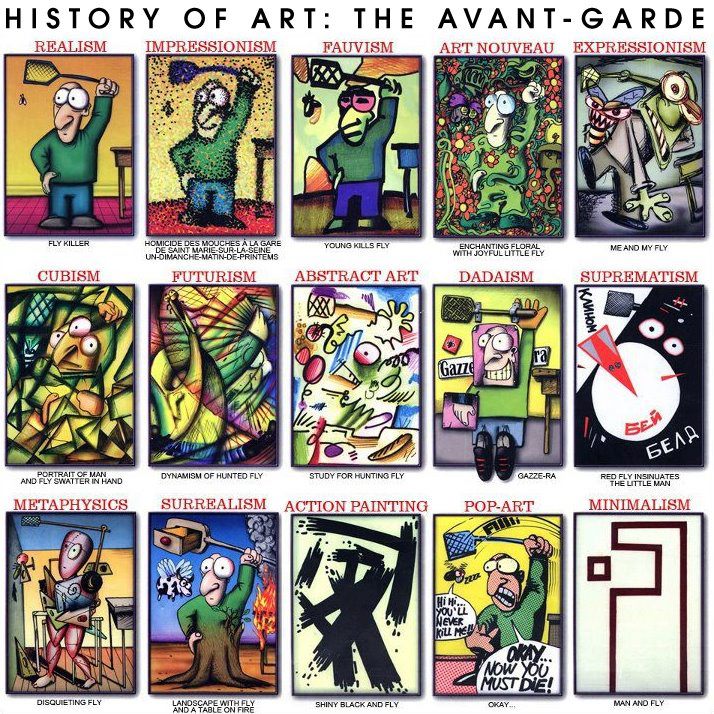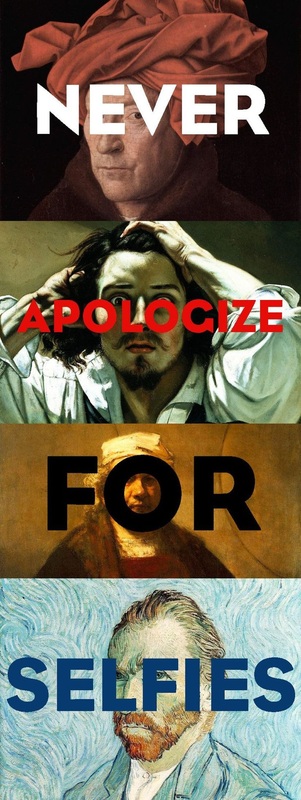| apah_review_worksheet.pdf |
Here is a review sheet (blank) for you to fill in if you wish. You can review in any number of ways, but use of flashcards is best! You should have a GREAT set at this point if you've kept your cards, and kept them organized.
0 Comments
So we have a lot to cover in very little time and writing and review as well before you take the exam. Here is the way I propose we finish... Tuesday 3/30- 19th Century Test to take home and hand in on Monday 4/6 Monday 4/6 we start Modern Art (CH 31) Friday 4/10- Modern test Friday 4/17- last test (Int scene CH 32) take home Over April Break: you will have four 30-min long essays to write. You will choose 4 out of 8 prompts.. You will have to outline all of them, but only actually write 4 of them. You will also have a section of review to make and when we return you will have to present it to the class. More on this later. We are down to the wire. Plan on having some good conversation on the bus on Wed and also on the trip to the Met! Hello Everyone,
We need 3 more students to enroll to do the tour. If we don't have this - we have to cancel the tour. :( If you have friends who are 11 or 12 grade and who are responsible and will be able to attend, please tell them to enroll on MyPaymentsPlus and see me for a permission slip ASAP. Payment closes on 3/30 so they need to act fast. :) Mrs. V Click on the image above to read more!
Or Click here HW # 10 is up on quiz star. It is 8 short answer questions and will be due April 8th (The day of the field trip).
This
So APAH is now on Twitter! :)
You can follow : @amityapah This will also allow us to use Meerkat - a live video streaming program which I can set up to review things with you over the web at home… I still need to test things out a bit, but I think it could be quite useful! PLEASE READ THE BOOK!!! And also - I need permission slips for MoMA from Pat and Noah. and some of you need to pay for the Met ASAP. :) You guys need to pay for the Met… Here is what I currently have:
Jacob - good Linda - good Kahari - good Naomi - good Noah - good Cae - needs to pay Pat - needs to pay (and also needs to PAY and give a slip for MoMA) Care - needs to pay Diana - needs to pay Anthony - needs to pay and needs to submit slip Last reminder -
TAKE Homework #9 and the Ch. 29 test NOW… only 3 people have done this. Reading through some of your responses on the question about the reformation and its affect on art on your 16th Century Northern test... I have noticed its unclear to some of you about what happened.
I cannot stress enough that you NEED TO BE READING THE BOOK.... many of your responses are unclear, muddy and surface (seeming to come mostly from what I say in lectures or from the powerpoint...) we cannot cover everything you need to know in the class time we have, and not everything is covered in the powerpoints, so you must read the chapters to keep up. You will save yourself a lot of time if you just read the chapter - I know it seems like a lot, but you really need to read it and know it... Here is an additional resource on the Reformation and art in the north - it shouldn't replace what you get from the book, but at least it makes things a little clearer for you: http://en.wikipedia.org/wiki/The_Reformation_and_art 1. Please make sure you've taken the test online for chapter 29 (18th Century) as we are starting 19th century tomorrow.
2. MOST OF YOU HAVE NOT COMPLETED HOMEWORK #9 on quiz star - you MUST DO THIS OR IT WILL BE A ZERO!!! 3. If you have not paid for the MoMA trip on MyPaymentsPlus - you must do so ASAP. Mrs. Zamachaj is needing final head counts for the trip to "go" and is still missing a lot of sign-ups. You also NEED TO SUBMIT A PERMISSION SLIP ASAP. Payment closes 3/23 and she is needing everyone to sign up before that if possible, or we won't go. 4. On the same token - you need to submit your Met permission slips ASAP and pay, I need to know a number so I can ask more students if I need to so we can actually go. 5. I will not be here on Thursday, so Tues and Wed we will get through much of the 19th century powerpoint and Thursday you will be required to continue. I will update how many slides you will need to cover on your own. Some of you had a hard time with the question on humanism and The School of Athens and how it reflects "humanist" interests. Below is a statement from AP Test Prep about Renaissance Humanism:
The defining concept of the Renaissance was humanism, a literary movement that began in Italy during the fourteenth century. Humanism was a distinct movement because it broke from the medieval tradition of having pious religious motivation for creating art or works of literature. Humanist writers were concerned with worldly or secular subjects rather than strictly religious themes. Such emphasis on secularism was the result of a more materialistic view of the world. Unlike the Medieval Era, Renaissance people were concerned with money and the enjoyment of life and all its worldly pleasures. Humanist writers glorified the individual and believed that man was the measure of all things and had unlimited potential. Humanism had far-reaching effects throughout Italy and Europe. The advent of humanism ended the church dominance of written history. Humanist writers secularized the view of history by writing from a nonreligious viewpoint. The Humanists also had a great effect on education. They believed that education stimulated the creative powers of the individual. They supported studying grammar, poetry, and history, as well as mathematics, astronomy, and music. Humanists promoted the concept of the well-rounded, or Renaissance man, who was proficient in both intellectual and physical endeavors. Humanist writers sought to understand human nature through a study of classical writers such as Plato and Aristotle. They believed that the classical writers of Ancient Greece and Rome could teach important ideas about life, love, and beauty. The revival of interest in the classical models of Greece and Rome was centered primarily among the educated people of the Italian city-states and focused on literature and writing. During the Middle Ages in Western Europe, Latin was the language of the Church and the educated people. The Humanist writers began to use the vernacular, the national languages of a country, in addition to Latin. The Chapter 29 (18th Century) Test is up on quiz star. Please complete by Wednesday 3/18.
If you have make-up work, please also complete. (THAT MEANS IF YOU HAVE NOT COMPLETED HOMEWORK #9 ON QUIZSTAR… aka everyone except Diana…. DO IT!) The following are registered for the APAH exam:
DelVecchio, C. Karsanow, D. Leibowitz, J. Sacco, A. Simon, N. That means: Kahari Pat Linda Cae Naomi NEED TO REGISTER I will give you extra credit if you attend the following lecture at the Yale University Art Gallery on Thursday, April 9th.
Lecture: Lucy Lippard on Art and Archaeology Thursday, April 9, 2015, 5:30 pm Lucy R. Lippard, world-renowned art critic, activist, curator, and writer, discusses the relationships among history, culture, and place in contemporary art. Reception to follow. Generously sponsored by the Martin A. Ryerson Lectureship Fund. Open to: General Public - See more at: http://artgallery.yale.edu/calendar/events/lecture-lucy-lippard-art-and-archaeology#sthash.rD33TryS.dpuf Please don't forget your permission slips -
As of right now I have the following: MoMA: Naomi, Diana, Kahari, Jacob (I know there are some of you who have given a slip to Mrs. Zamachaj, just please let me know who…) Met: Jacob, Naomi, Caroline Important Artists (not all will be on the test, but you should absolutely KNOW these artists)
Valazquez Bernini Rubens Rembrandt Caravaggio Poussin Gentileschi You will have 24 multiple choice and a 30 minute essay on "domestic spaces" which you should also be able to pull from previous periods we've studied. (so make sure you have one or two works that depict this theme from an earlier period - ie. before 1700) I can stay until 3:30 today if anyone wants to come review with me. Just come to my room right at the end of the day or e-mail me: [email protected] |
|||||||





